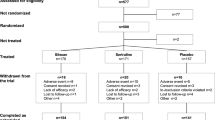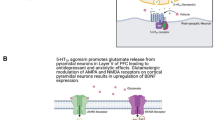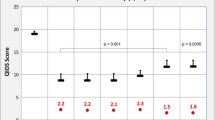Abstract
This article summarizes recent findings from the STEP-BD project pertaining to bipolar depression treatment. Highlighted are four papers that report, in turn, a large, randomized controlled trial of adjunctive antidepressants; a large, randomized controlled trial of adjunctive psychosocial therapies (cognitive-behavioral therapy, interpersonal social rhythms therapy, and family-focused therapy); a small, randomized controlled trial contrasting lamotrigine, risperidone, and inositol as add-on therapies for refractory bipolar depression; and a naturalistic study of the risks of relapse during preventive therapy. The STEP-BD results highlight the challenge of treating bipolar depression to remission, illustrate the value of adjunctive psychotherapies, and point to new directions for research.
Similar content being viewed by others
References and Recommended Reading
Lieberman JA, Stroup TS, McEvoy JP, et al.: Effectiveness of antipsychotic drugs in patients with chronic schizophrenia. N Engl J Med 2005, 353:1209–1223.
Rush AJ, Trivedi MH, Wisniewski SR, et al.: Acute and longer-term outcomes in depressed outpatients requiring one or several treatment steps: a STAR*D report. Am J Psychiatry 2006, 163:1905–1917
Sachs GS, Thase ME, Otto MW, et al.: Rationale, design, and methods of the Systematic Treatment Enhancement Program for Bipolar Disorder (STEP-BD). Biol Psychiatry 2003, 53:1028–1042.
Post RM, Altshuler LL, Leverich GS, et al.: Mood switch in bipolar depression: comparison of adjunctive venlafaxine, bupropion and sertraline. Br J Psychiatry 2006, 189:124–131.
Thase ME, Sachs GS: Bipolar depression: pharmacotherapy and related therapeutic strategies. Biol Psychiatry 2000, 48:558–572.
Lavori PW, Rush AJ, Wisniewski SR, et al.: Strengthening clinical effectiveness trials: equipoise-stratified randomization. Biol Psychiatry 2001, 50:792–801.
Sachs GS, Printz DJ, Kahn DA, et al.: The Expert Consensus Guideline Series: Medication Treatment of Bipolar Disorder 2000. Postgrad Med 2000, April:1–104.
Miklowitz DJ, Otto MW, Frank E, et al.: Psychosocial treatments for bipolar depression: a 1-year randomized trial from the Systematic Treatment Enhancement Program. Arch Gen Psychiatry 2007, 64:419–426.
Miklowitz DJ, Otto MW, Frank E, et al.: Intensive psychosocial intervention enhances functioning in patients with bipolar depression: results from a 9-month randomized controlled trial. Am J Psychiatry 2007, 164:1340–1347.
Chengappa KN, Levine J, Gershon S, et al.: Inositol as an add-on treatment for bipolar depression. Bipolar Disord 2000, 2:47–55.
Nolen WA, Kupka RW, Hellemann G, et al.: Tranylcypromine vs. lamotrigine in the treatment of refractory bipolar depression: a failed but clinically useful study. Acta Psychiatr Scand 2007, 115:360–365.
Tohen M, Vieta E, Calabrese J, et al.: Efficacy of olanzapine and olanzapine-fluoxetine combination in the treatment of bipolar I depression. Arch Gen Psychiatry 2003, 60:1079–1088.
Calabrese JR, Keck PE, MacFadden W, et al.: A randomized, double-blind, placebo-controlled trial of quetiapine in the treatment of bipolar I or II depression. Am J Psychiatry 2005, 162:1351–1360.
Thase ME, MacFadden W, Weisler RH, et al.: Efficacy of quetiapine monotherapy in bipolar I and II depression: a double-blind, placebo-controlled study (The BOLDER II study). J Clin Psychopharmacol 2006, 26:600–609.
Perlis RH, Ostacher MJ, Patel JK, et al.: Predictors of recurrence in bipolar disorder: primary outcomes from the Systematic Treatment Enhancement Program for Bipolar Disorder (STEP-BD). Am J Psychiatry 2006, 163:217–224.
Goldberg JF, Perlis RH, Ghaemi SN, et al.: Adjunctive antidepressant use and symptomatic recovery among bipolar depressed patients with concomitant manic symptoms: findings from the STEP-BD. Am J Psychiatry 2007, 164:1348–1355.
Sachs GS, Nierenberg AA, Calabrese JR, et al.: Effectiveness of adjunctive antidepressant treatment for bipolar depression. N Engl J Med 2007, 356:1711–1722.
Author information
Authors and Affiliations
Corresponding author
Rights and permissions
About this article
Cite this article
Thase, M.E. STEP-BD and bipolar depression: What have we learned?. Curr Psychiatry Rep 9, 497–503 (2007). https://doi.org/10.1007/s11920-007-0068-9
Published:
Issue Date:
DOI: https://doi.org/10.1007/s11920-007-0068-9




